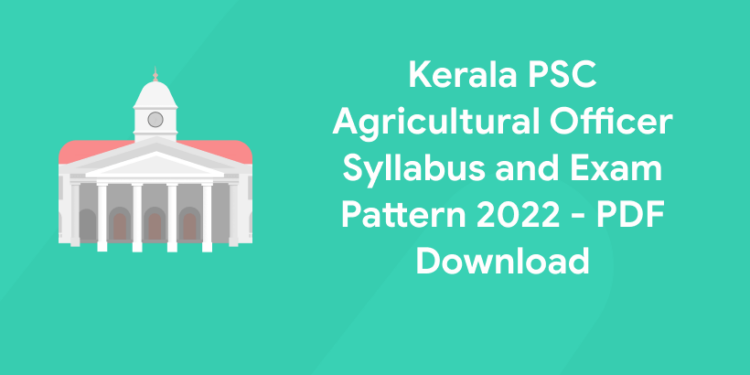Table of Contents
Kerala Public Service Commission will be recruiting eligible candidates for the post of Agricultural Officer ibn the Department of Agriculture Development & Farmers’ Welfare (Kerala). An official notification regarding this was released by the Commission earlier. Candidates planning to apply for this post will have to appear for an exam conducted by the Commission. Kerala PSC Agricultural Officer exam will be held on 28 September 2022, Wednesday. Candidates who meets eligibility requirements will be selected through Direct recruitment. This article provides the exam pattern and syllabus for Kerala PSC Agricultural Officer Recruitment 2022.
Candidates who successfully submitted their confirmation on or before 12.07.2022 can download the Admission Tickets through their One Time Registration Profile in the website www.keralapsc.gov.in from 14.09.2022
Kerala PSC Agricultural Officer Syllabus and Exam Pattern 2022
Visit this page to view the Kerala PSC Agricultural Officer Syllabus 2022. On the scheduled day, the Kerala Public Service Commission intends to hold the exam for the position of Agricultural Officer. The Kerala PSC AO Syllabus 2022 is essential reading for everyone taking the test. For precise details on the Kerala Agricultural Officer Syllabus 2022, applicants can read this complete website. In the sections below, we have also provided information about the Kerala PSC Agricultural Officer Exam Pattern 2022.
The exam is held for 100 marks and the time allotted is 1 hour 30 minutes. The mode of the exam is online (objective multiple choice) and the questions are based on educational qualification. The exam medium is English and the exam is conducted in 3 parts. For an elaborated exam pattern check out the third section.
| Kerala PSC Agricultural Officer Syllabus 2022 Download Here | |
| Name of the Organization | Kerala Public Service Commission |
| Name of the Post | Agricultural Officer |
| Category | Syllabus |
| Syllabus and exam pattern Status | Available |
| Official Portal | keralapsc.gov.in |
- The candidate should know the syllabus and exam pattern for attending the Kerala PSC Agricultural Officer examination.
- Candidates must be good at problem solving to crack the all sections in the Kerala PSC Agricultural Officer examinations.
- Candidates must solve the Previous year questions papers and attempt a maximum number of mock tests of the Agricultural Officer Examination to enhance their preparation.
- Candidates must focus on Crop Production, Crop Improvement and Crop Protection mostly as both have maximum weightage in the written examination.
- Candidates must regularly update themselves by regularly visiting the official website of Kerala PSC to know with the latest KPSC Agricultural Officer exam updates.
Attempt free mock tests for Kerala PSC exams with Entri App!
Kerala PSC Agricultural Officer Exam Pattern 2022
Applicants can find the precise Kerala PSC Agricultural Officer Exam Pattern 2022 here. Aspirants who are appearing for this exam can make a note of the complete details regarding the exam pattern and structure of the paper. Candidates can get a complete idea regarding the written examination of the Agricultural Officer post. Also, it helps you to study effectively. It becomes easier for you to know which are the important topics that need your focus. Through solving mock tests, you may get an idea of the important topics while preparing. Solving out mock test questions adds more points to your exams. The chances of reappearing the previous year’s questions in the exams are high. Thus, it is very relevant to find exam patterns.
| Part | Module |
| Part-I Crop Production | Agronomy |
| Soil Science & Agricultural Chemistry | |
| Part-II Crop Protection | Agricultural Entomology |
| Plant Pathology | |
| Part-III Crop Improvement | Plant Breeding & Genetics |
| Seed & Seed Technology | |
| Part-IV Others | Horticulture |
| Olericulture | |
| Agricultural Economics | |
| Agricultural Extension | |
| Total Marks | 100 Marks |
| Duration | 1 Hour 30 Minutes |
- The total marks for this exam shall be conducted in 100.
- The time allotted for the exam is 1 hour 30 minutes OR 90 minutes.
- The mode of the exam is online (objective multiple choice).
- There shall be 3 parts to this exam with distributed modules and each module weighs 10 marks.
- The questions shall be based on Educational Qualification.
- The medium of the exam is English.
Grab Study Materials for Kerala PSC Exams !!! Register Now !!!
Kerala PSC Agricultural Officer Syllabus 2022
People who are searching for Kerala Public Service Commission Agricultural Officer exam Syllabus can get the required details from this page. As the Kerala PSC exam conducting board is planning to select the interested and eligible candidates through the written examination, candidates who are willing to get the Kerala PSC Agricultural Officer Post must know about the details of the exam. The candidates will benefit from knowing the subjects and topics if they want to perform well in the test.
PART I – CROP PRODUCTION
MODULE 1: AGRONOMY
Agronomy – scope, seeds and sowing, tillage and tilth, crop density, and geometry.
Classification of crops – agronomic, botanical, onto genic. Growth and development of crops, factors affecting growth and development, crop rotation and its principles, adaptation, and distribution of crops.
Crop nutrition essential nutrients – criteria of essentiality, classification, functions, and deficiencies – manures and fertilizers – nutrient use efficiency – fertilizer calculations. Specialty fertilizers – 100 percent water-soluble, fortified, customized, slow-release fertilizers, nitrification inhibitors. Biological nitrogen fixation – biofertilizers. Weeds – importance, classification, invasive weeds of Kerala, crop weed competition, allelopathy, concepts of weed management – principles and methods, herbicides – classification, selectivity and resistance, allelopathy. Herbicide calculations, calibration of sprayers, and spraying specifications for herbicides. Integrated weed management in rice, banana, coconut.
Agriculture –scope- Importance of agriculture and agricultural resources available in India; Farming system components – Cropping system and pattern, multiple cropping system-Sustainable agriculture problems and its impact on agriculture, indicators of sustainability, adaptation, and mitigation, conservation agriculture strategies, HEIA, LEIA, and LEISA, ecological principles of LEISA.
Homestead farming system. Economic importance – soil and climatic requirements – area and production – varieties – seed rate spacing – methods of sowing/planting -manorial schedule- cultural practices and yield of major field crops of Kerala, viz, rice, tuber crops (cassava, sweet potato, yams, and aroids), sugarcane, pulses, groundnut, sesames and fodder crops, viz., guinea and hybrid Napier. Irrigation- Water management of principal crops of Kerala.- Water resources and irrigation development in India and Kerala. Soil moisture constants-Evapotranspiration, potential evapotranspiration and consumptive use, Reference crop evapotranspiration (ETo)- Crop coefficient (Kc)- Kc values for different crops. Main empirical methods of calculation of ETo- Effective rainfall, the Water requirement of crops- Scheduling irrigation – Methods of irrigation-.Surface, subsurface, overhead and micro irrigations. Irrigation efficiency – Water productivity and water use efficiency- Agricultural drainage-causes of waterlogging and types of drainage.
Quality of irrigation water. Agroecology of Kerala – agro- ecological zones and agro – ecological units, monsoon in Kerala, cropping seasons of Kerala. Rainfed agriculture – dry farming, dryland farming, rainfed farming. Drought – classification, drought adaptation mechanisms in crops, drought management in major crops of Kerala. Watershed – types –characteristics and management.
MODULE 2: SOIL SCIENCE & AGRICULTURAL CHEMISTRY
Soil-Pedological and edaphological concepts. Weathering – soil formation – factors and processes – soil profile. Soil physical properties – soil texture – soil consistency – soil crusting-bulk density and particle density of soils and porosity – their significance and manipulation- Soil compaction – Soil color. Soils of India – geological processes and formations – characterization of soils of Kerala. Soil colloids – properties – nature – types and significance. Layer silicate clays – their genesis and sources of charges. Adsorption of ions – ion exchange – CEC and AEC – Concept of pH – soil acidity – saline, sodic and calcareous soils. Soil organic matter – composition – decomposability – humus – fractionation of organic matter. Carbon cycle – C: N ratio. Soil biology – biomass – soil organisms and their beneficial and harmful roles. Soil fertility evaluation – soil testing – rating of soil fertility (organic carbon, major, secondary and micronutrients). Problem soils of Kerala – characteristics, problems and management/reclamation; Salt affected soils- Arid soils -Acid soils- submerged soils Eroded soils-Acid sulphate soils-Degraded soils. Organic farming and food security- Tools and practices of organic farming. Organic certification – accreditation agencies, certification agencies, NSOP, NPOP. Precision agriculture: Geo-informatics- GIS and Remote sensing concepts application in agriculture-Global positioning system (GPS), components and its functions. Nanotechnology definition, concepts and techniques, Nano-particles, Nano-pesticides, Nano-fertilizers, Nano-sensors
PART II- CROP PROTECTION
MODULE : AGRICULTURAL ENTOMOLOGY
Categories of pests of agriculture -Economic classification of insects- External Morphology, Anatomy and general Physiology, structure and function of digestive, circulatory, respiratory, excretory, reproductive, endocrine, exocrine, nervous systems and sense organs. Types of metamorphosis Integrated Pest Management: Principles of IPM, concept of economic threshold and economic injury levels, tools of IPM -. Basic concept of host plant resistance. Biocontrol of pests -Microbial control Regulatory control- plant quarantine and phytosanitary certificate. Pesticides: Insecticide act and rules. Newer trends in insect pest management – pheromones, Insect Growth Regulators, Chitin synthesis Inhibitors, biotechnological methods. Distribution, bioecology, nature and symptoms of damage and management strategies of major insect pests of Field crops: rice, wheat, maize, sorghum, Ragi, sugarcane, cotton and oil seeds – groundnut, sesamum, castor, sunflower and mustard, pulses. Vegetable crops: solanaceous ,cruciferous , leafy vegetables polyhouse vegetables; tuber crops , fruit crops, plantation crops, ornamentals, medicinal and aromatic plants and stored products pests. Economically important insects – silkworms, lac insects, pollinators, predators, parasites, weed killers, soil builders, scavengers and insects used for scientific investigation. Damage in major crops and management of nematodes, mites, rodents, birds, mollusks (snail).
MODULE 4: PLANT PATHOLOGY
Importance of plant diseases-. Important plant pathogenic organisms- Fungi, bacteria, fastidious vascular bacteria, virus, viroid’s, phytoplasma, Spiro plasma, algae, protozoa, nematodes, phanerogamic parasites. Diseases due to abiotic /biotic causes: Causes/ factors affecting disease development disease triangle and tetrahedron. Fungi-.Bacteria-Viruses and mollicutes-Morphology, classification, reproduction, transmission, dispersal and survival. Categories of diseases-IDM; Epidemiology: Factors affecting disease development. Principles and methods of plant disease management symptoms, etiology, disease cycle and management of diseases of rice, wheat, sugarcane, groundnut, pulses, vegetables, tubers, citrus, mango, banana, grapevine, pineapple, papaya, guava, sapota, cashew, apple, coconut, arecanut, cocoa, black pepper, ginger, cardamom, tree spices, oil palm, betel vine, coffee, tea, rubber and ornamentals. Methods of control: Host plant resistance, cultural, mechanical, physical, legislative, biological and chemical control. Survey, surveillance and forecasting of diseases. Development and validation of IDM module- IDM Programmes in cereals, vegetables, pulses, tuber crops, spices and plantation crops and ornamentals.
Part III: CROP IMPROVEMENT
MODULE 5: PLANT BREEDING AND GENETICS
Heredity, Mendelian principles of heredity, Cell division –.Mutation, classification, Methods of inducing mutation & CIB technique, mutagenic agents and induction of mutation. Qualitative & Quantitative traits, Polygenes and continuous variations, multiple factor hypothesis, Domestication, Acclimatization, Multiline concept. Hardy-Weinberg Law, Genetic basis and methods of breeding cross pollinated crops, modes of selection; Heterosis and inbreeding depression, development of inbred lines and hybrids, composite and synthetic varieties. Major breeding objectives for crop improvement and procedures including conventional and modern innovative approaches for development of hybrids and varieties for yield, adaptability, stability, abiotic and biotic stress tolerance and quality. Seed production technology in self pollinated, cross pollinated and vegetative propagated crops. Hybrid seed production technology in Maize, Rice, Sorghum, Pearl millet and Pigeon pea, etc. Ideotype concept and climate resilient crop varieties for future. Germplasm – Methods of conservation and utilization in crop improvement. Micropropagation -organogenesis and embryogenesis-different stages of micropropagation – commercial micropropagation, quality assurance of tissue culture plants. Plant tissue culture for crop improvement. Intellectual Property Rights – meaning, GATT, WTO, TRIPs, WIPO, patents, copyrights, trademark, industrial design, geographical indications, integrated circuits, trade secrets. Patent Act 1970 and patent system in India.
MODULE 6: SEED AND SEED TECHNOLOGY
Seed certification, field inspection- Foundation and certified seed production of important cereals (Rice, wheat and maize), pulses (Cowpea, mung, urd, pigeon pea, field bean and soybean), oilseeds (Sesame, coconut, sunflower, groundnut), fodder (Guinea grass, Napier grass and lucre), and vegetables (Bhindi, tomato, brinjal, chilies and cucurbitaceous vegetables). Seed Act and Seed Act enforcement- Central Seed Committee, Central Seed Certification Board, State Seed Certification Agency, Central and State Seed Testing Laboratories. Seeds Control Order 1983 and Seed Bill 2004, IPR- Intellectual Property Rights
PART –III OTHERS
MODULE 7: HORTICULTURE
Horticulture – area, production, productivity of horticultural crops in India and Kerala – branches of horticulture – major fruit crops (Pomology) – importance, nutritional value, production technologies. Commercial orchards, gardens and plantations – selection of site for crops – climate, soil, socioeconomic factors; Techniques of training and pruning , problems of unfruitfulness – internal factors, external factors. Plant growth regulators in horticulture -.Plant propagation techniques – definition and basic concepts, type-structures – commercial propagation of horticultural crops; Micro propagation of horticultural plants .Important seed and herbal classification ,medicinal plants -different methods of classification, active principles, aromatic plants- Botany, varieties, production technology, active principles and uses, plantation crops of Kerala – commercially cultivated varieties, production technologies – improved propagation methods. Ornamental and flowering plants (Floriculture) –– cultivation of commercial ornamental and flower crops. Gardening and landscaping-scope and methods. Post harvest management of major horticultural crops of Kerala.
MODULE 8: OLERICULTURE
Importance and scope of vegetable crops in India with special reference to Kerala-Production and management of warm season and cool vegetables of Kerala. Types of vegetable farming-Systems of vegetable cultivation- traditional and specialized systems; Factors affecting vegetable production Basic principles in vegetable production- nursery, sowing and transplanting, care and management. Plant protection special precautions in vegetables- Seed production in cool season vegetables, post harvest handling- losses; causes and measures to reduce losses; Packing and transport, marketing of vegetables.
MODULE 9: AGRICULTURAL ECONOMICS
Agricultural economics- Basic concepts: Goods and services, desire, want, demand, utility, cost and price, wealth, tax, capital, income and welfare. Theories- Utility theory; law of diminishing marginal utility, equip-marginal utility principle. Agricultural Marketing: Concepts and definitions of market, marketing, agricultural marketing, market structure, marketing mix and market segmentation, classification and characteristics of agricultural markets- demand, supply and producer’s surplus of argic-commodities: nature and determinants of demand and supply of farm products, producer’s surplus.
MODULE 10: AGRICULTURAL EXTENSION
Extension Education-Extension Programme planning- Meaning, Process, Principles and Steps in Programme Development. Extension systems in India: various extension/ agriculture development Programmes launched by ICAR/ Govt. of India (IADP, IAAP, HYVP, KVK, IVLP, ORP, ND, NATP, NAIP, etc.). New trends in agricultural extension-Various rural development Programmes launched by Govt. of India. Community development-Rural Leadership: concept and definition, types of leaders in rural context; extension administration. Extension teaching methods- Sociology and Rural sociology. Management in extension, participatory approaches, entrepreneurship in agriculture, communication and transfer of technology in agriculture.
Attempt free mock tests for Kerala PSC exams with Entri App!
How to Download Kerala PSC Agricultural Officer Syllabus 2022?
For the ease of candidates, Kerala PSC appearing candidates get to know the syllabus downloading methods. Here are few steps for downloading Kerala PSC Agricultural Officer Syllabus,
- Visit the official website of Kerala Public Service Commission @kpsc.gov.in
- Select the Recruitment tab F the home page.
- To Download Exam Pattern and Syllabus section scroll down.
- Check the syllabus link and click on it.
- Pdf of the Syllabus will appear on the screen
- Then you can download the Kerala PSC Agricultural Officer Syllabus 2022.
- Lastly, You can view Kerala PSC Agricultural Officer Syllabus 2022 and ensure all relevant contents and topics in it.
Kerala PSC Agricultural Officer Syllabus 2022 PDF
Candidates who have applied for the Kerala PSC Agricultural Officer Posts and going to appear for the written examination must download the Kerala PSC Agricultural Officer Syllabus 2022 & Exam Pattern and start the preparation of the written examination. Click on the below link to download PDF of the Kerala PSC Agricultural Officer Syllabus 2022.
KERALA PSC AGRICULTURAL OFFICER SYLLABUS PDF – DOWNLOAD HERE!
All applicants must take their studies seriously and stick to a disciplined study plan as soon as the exam dates are announced if they want to perform well on the exam. As there are fewer openings, there will be a fierce rivalry. So choose useful study tools to aid in your preparation. Entri keeps you up to date.
I hope you learned something from and found this article beneficial. Download the Entri App for the best job preparation and education available. You can obtain formative assessments, old test questions, crash courses, and take a variety of exam prep through Entri. Entri offers you efficient and personalized study services.
Attempt free mock tests for Kerala PSC exams with Entri App!













